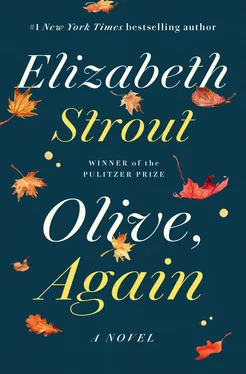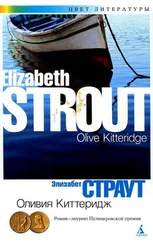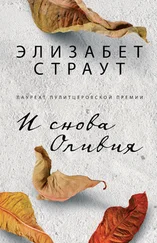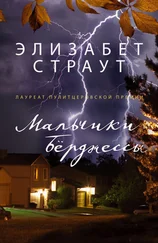“How many do you have?”
“Oh, I have just the one. A son. That’s enough. I have a stepdaughter too. She’s lovely. Lovely girl.” Olive nodded. “A lesbian.”
“Does she like you?”
This question surprised Olive. “I think she does,” she said. “Yes, she does.”
“So you have that.”
“It’s not the same. I met her when she was a grown-up, and she lives in California. It’s not like your own kid.”
“Why is your son a needle in your heart?” The girl asked this with hesitancy, as she tore at the orange peel that had garnished her plate.
“Who knows? Born that way, I guess.” Olive wiped her fingers on a napkin. “You can put that in a poem. All yours.”
The girl said nothing, only looked up through the window at the bay.
It was then that Olive noticed the girl’s sweater, a navy-blue thing with a zipper up the front. But the cuffs were grimy, old-looking. Surely the girl could afford some nice clothes. Olive moved her eyes away quickly, as though she’d seen something she ought not to have seen. She said, “Well, it was good of you to let me join you. I’ll be on my way.”
The girl looked at her, startled. “Oh—” she said. “Oh, Mrs. Kitteridge, please don’t go. Have some more coffee. Oh, you’re not drinking coffee. Do you want a cup of coffee?”
“I don’t drink coffee anymore,” Olive said. “It doesn’t seem to agree with my bowels. But have some more if you’d like. I’ll wait with you while you have some.” She turned to find the girl who worked here, and the girl came right over and was very pleasant to Andrea. “There you go,” the girl said, smiling—smiling!—at Andrea, and poured her a cup of coffee. “When you get old,” Olive told Andrea after the girl had walked away, “you become invisible. It’s just the truth. And yet it’s freeing in a way.”
Andrea looked at her searchingly. “Tell me how it’s freeing.”
“Well.” Olive was slightly taken aback; she didn’t know how to explain it. “It’s just that you don’t count anymore, and there is something freeing about that.”
“I don’t understand,” the girl said. And what shot through Olive’s mind was the thought: You’re honest.
Olive said, “I don’t think I can explain this well. But you go through life and you think you’re something. Not in a good way, and not in a bad way. But you think you are something. And then you see”—and Olive shrugged in the direction of the girl who had served the coffee—“that you no longer are anything. To a waitress with a huge hind end, you’ve become invisible. And it’s freeing.” She watched Andrea’s face and saw that it was struggling with something.
Finally the girl said, “Well, I envy you.” And she laughed, and Olive saw that her teeth were bad; she wondered briefly why she had not seen this in photos of the girl. “I envy you for ever thinking you were something,” Andrea said, her voice throaty.
“Oh, now stop it, Andrea. Last I heard you were Poet Laureate of this country a few years back.”
“Yeah,” said Andrea. “I was.”
—
As they walked toward Olive’s car, Olive going faster than she would have on her own, the girl rummaged in her coat pocket and the next thing Olive knew a plume of cigarette smoke was going over her. Olive felt a deep tremor of disappointment, and she thought: Well, she’s just a L’Rieux. That’s all she is. Famous or not.
Andrea said, as they stood by Olive’s car, lifting her hand with the cigarette held between two fingers, “It’s all about class now, smoking. It’s like shooting heroin, but that’s not really a class thing anymore.” And then—and this surprised Olive like hell—the girl wrapped her arms around Olive and said, “It was so nice to see you, Mrs. Kitteridge.” Olive thought her hair might catch on fire from the cigarette in the girl’s hand.
“You too,” said Olive, and she got into her car and started it, and backed away slowly, not looking out the window in the direction of the girl—it was a job to back a car up these days. All the way home she told Jack about what had happened; it was Jack, her second husband, whom she seemed to want to tell this to.
—
When she spoke on the telephone that night to her son, Christopher, who lived in New York City, she mentioned seeing the girl, and he said, “Who’s Andrea L’Rieux? You mean one of the million L’Rieuxs in that family out on East Point Road?”
“Yes,” Olive said, “the one who became Poet Laureate.”
“Became what?” Christopher asked, not especially nicely, and Olive understood that Christopher did not follow Poets Laureate or anyone with whom he had grown up, though Andrea was younger than he was. “She became the Poet Laureate of the United States of America,” Olive said, and Christopher said, “Well, whoop-dee-do.”
When she told her stepdaughter, Cassie, on the telephone, the child was far more appreciative. “Oh, Olive, how nice! Wow.”
And when she told the owner of the bookstore—Olive walked in the next day with the sole purpose of telling him this—he said, “Hey, that’s very, very cool. Andrea L’Rieux, man, she’s just amazing.”
“Yup,” Olive said. “We had a nice chat. We had breakfast together. She was quite nice. Seemed very ordinary.”
She called her friend Edith, whose husband, Buzzy, had helped her buy the car; they lived in the assisted-living place out by Littlehale’s Farm; and Edith was pretty excited for her as well. “Olive, you’re the kind of person people want to talk to.”
“I don’t know about that,” Olive said, but then she thought that what Edith said was true. “She seemed a lonely child,” Olive said. “As though all her fame and whatnot has meant nothing to her. Sad child. Ratty clothes, smoking her head off. Really, Edith, she was a lonely thing.”
For a couple of weeks Olive waited to hear from Andrea. Each morning when she checked the mail, she realized she was waiting for a card, an old-fashioned, handwritten card that said, How lovely it was to see you, Mrs. Kitteridge. Let’s stay in touch! The girl could get her address from the Internet. But no card came, and after a while Olive stopped waiting for it. When she saw in the newspaper that Severin L’Rieux had died, she wondered if Andrea was still in town, most likely she had come back for the funeral, which according to the paper would be held at St. John’s, and that made sense to Olive; made her shudder a tiny bit too. All those French-Canadian Catholics, well—goodbye to Severin L’Rieux.
For their trip to Oslo, Jack had bought them first-class tickets for the plane. Olive was furious. “I don’t fly first-class,” she had said.
Jack had laughed. “You don’t fly anywhere,” he said, and that made her angrier.
“I’m not flying first-class. It’s obscene.”
“Obscene?” Jack sat down at the kitchen table and watched her, still with amusement in his face. “I like obscene.” When she didn’t answer him he said, “You know what, Olive? You’re a snob.”
“I am the opposite of a snob.”
Jack laughed a long time. “You think being a reverse snob is not being a snob? Olive, you’re a snob.” Then he leaned forward and said, “Oh, come on, Olive. For Christ’s sake. I’m seventy-eight years old, I have money, you have money—though, yes, I have a lot more money than you do—and if not now, when?”
“Never,” she said.
So she had flown coach while he sat up front in first class. She could not believe he would do that, but he did. “Bye now,” he said, waving his hand once, and she was left on her own to find her seat; it was the bulkhead. She sat in the aisle next to a large man—Olive was large herself—and by the window was the man’s girlfriend, an Asian girl probably twenty years younger, but how could you tell with Asians. Before they had even taken off, she hated them both. She was ready to cry when the flight attendant took her bag from her and put it in the overhead bin. “I want my bag,” Olive said, and the woman told her she could get it as soon as they were airborne.
Читать дальше













